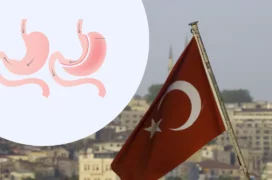How to Stop Hair Thinning After Bariatric Surgery: 4 Simple Tips
Hair loss is never a welcome surprise — and unfortunately, it’s more common than most people think. There are many reasons why hair falls out, and for some, it starts after weight loss surgery.
In this article, we’ll take a closer look at why hair loss happens after bariatric surgery and what you can do to manage or prevent it. If you’re noticing changes in your hair after weight loss surgery, keep reading — these tips might make all the difference.
Does Hair Loss Happen to Everyone After Weight Loss Surgery?
No, hair loss does not necessarily happen to everyone after weight loss surgery. However, it is a common issue for many people. Following the advice of your bariatric surgeon can reduce the chances of hair loss or even prevent it entirely. If you do experience hair loss, don’t worry — it’s a natural process and usually nothing to be concerned about.
Unlike other causes, hair loss after weight loss surgery is temporary and should not be a cause for concern. After the surgery, hair loss usually stops, and within a short time, your hair will return to its normal state. In this article, you will learn in detail why hair loss happens after surgeries like gastric sleeve or gastric bypass, and how to prevent it effectively.
Hair Loss and Its Severity in Different Types of Weight Loss Surgery
In general, most weight loss surgery procedures can cause some degree of hair loss. For example, gastric sleeve and gastric bypass surgeries are two common procedures after which some patients experience hair loss. Procedures like gastric banding can also cause hair loss, but compared to the other two methods, it tends to be much milder and lasts for a shorter period. There are two main reasons why hair loss is more common after gastric sleeve and bypass surgeries than other methods:
- First, compared to other weight loss surgery methods, patients who undergo gastric sleeve or gastric bypass tend to lose weight more rapidly.
- Second, after these two surgeries, some patients may face difficulties absorbing certain nutrients.
Why Does Hair Loss Occur After Weight Loss Surgery?
Recent research shows that two very important factors—physical stress and rapid weight loss—can cause a shift in the body’s nutrient delivery, redirecting nutrients to more vital organs like the brain, kidneys, liver, and others.
In these two conditions, most nutrients are redirected to the more vital organs, reducing the share of less critical organs. With that in mind, which do you think is more important: brain health or hair health? When the body faces nutrient deficiencies, should it prioritize feeding the brain or the hair?
Since gastric sleeve and gastric bypass are major surgeries, it is natural for the body to experience physical stress, so this issue is expected. On the other hand, patients lose weight rapidly after these procedures, which increases the likelihood of temporary hair loss.
Therefore, as one of the effects of weight loss surgery, hair growth temporarily slows down but returns to normal after some time. In most cases, hair loss begins about 3 to 5 months after the surgery. Gradually, the hair shedding decreases and eventually stops.
4 Effective Ways to Prevent Hair Loss After Sleeve Surgery
This article outlines 4 simple ways to prevent hair loss after procedures like gastric sleeve and gastric bypass surgery. By following these tips, you can avoid hair loss after surgery or significantly reduce its severity.
1- Protein, Protein, and More Protein!
Protein is an essential and highly beneficial nutrient for our body. This amazing substance plays a key role in building and maintaining many structures in our body, such as skin and hair cells. The minimum daily protein intake for the body is 60 grams. If we consume less than this amount, hair becomes thin and may even fall out.
To avoid hair loss after surgery, make sure to include a good amount of protein in every meal. The following foods are rich in protein and are recommended to be part of your diet after weight loss surgery:
- Skinless chicken
- Red meat
- Fried or baked fish
- Some low-fat cheeses
- Greek yogurt
- Beans
- Chia seeds
- Flaxseeds
2- Don’t Forget Your Vitamin Supplements!
A deficiency in many nutrients can cause hair loss, and taking vitamin supplements can help address these shortages. Therefore, consider vitamin supplements—especially B-complex vitamins—as essential. They can improve hair health and help prevent hair loss.
Take all your vitamin and weight loss supplements under the supervision of your bariatric specialist or surgeon at least two weeks before surgery. This will help prevent hair loss after the surgery and also minimize the chances of fatigue and weakness caused by the operation.
3- Iron Is Extremely, Extremely Important!
If you are still experiencing hair loss seven months after your sleeve gastrectomy or gastric bypass surgery, it’s important to check your iron levels. Iron is a vital micronutrient for the body, and its deficiency can cause hair loss. But how can you know what your iron levels are?
To measure your body’s iron level, a protein called ferritin is tested. If your blood ferritin level is low, it means you have an iron deficiency. If you suspect your iron levels are low, consult your nutritionist or bariatric surgeon. Some common symptoms of iron deficiency include:
- Fatigue
- Lethargy (feeling weak or sluggish)
- Pale skin (loss of color)
- Weakness
- Changes in body temperature
To compensate for iron deficiency, you can use iron supplements or add iron-rich foods to your diet:
- Liver
- Egg yolk
- Leafy green vegetables
- Beans
4- Try Zinc!
If you’ve tried the methods above but still experience hair loss (which is unlikely—there’s a 90% chance these steps will stop it), try adding zinc to your diet. Zinc is a very important and valuable mineral for hair growth and maintaining healthy skin and hair.
But before you start taking any zinc supplements, be sure to consult with your nutritionist or bariatric surgeon so they can prescribe the appropriate dosage if needed. Excessive zinc intake can cause side effects. Foods like chicken, shellfish, and red meat are good natural sources of this essential nutrient.
Other nutrients that promote hair growth and help prevent hair loss after sleeve gastrectomy and gastric bypass surgery include:
- Vitamin A,
- Folate,
- Vitamin B6,
- and essential fatty acids
Hair loss can also be caused by systemic diseases such as thyroid disorders, polycystic ovary syndrome (PCOS) in women, or even genetic problems.
Frequently Asked Questions About Hair Loss After Weight Loss Surgeries like Gastric Sleeve, Bypass, and More
No. In most cases, hair loss is temporary and improves within a few months with better nutrition.
If hair loss continues for more than 6 months or becomes severe, it is advisable to consult a doctor.
No. The severity and likelihood of hair loss vary depending on the type of surgery; in some procedures like gastric bypass, it is more common.
No. Supplements should be taken under a doctor’s supervision to prevent potential side effects.





